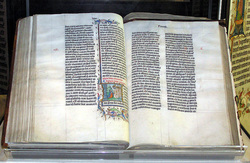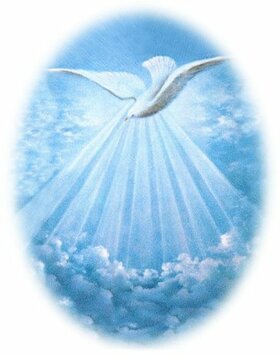The Bible in the Church

There is no conflict nor any contradiction between the Bible and the Church! On the contrary, the Church created the Old and New Testaments and venerates them, as the Catechism of the Catholic Church notes in paragraph 103, as "she venerates the Lord’s body." The Catechism also teaches us that "the inspired books teach the truth" without error–-not mind you all knowledge about God or even all salvation history, but rather, what we need to know "for the sake of our salvation." But it is also important to note that despite our reverence and dependence upon the Bible as the inerrant word of God in matters of faith and morals, the Christian faith, as the Catechism of Catholic Church observes in paragraph 108, is not a "religion of the book.."
The Catechism says, "Christianity is the religion of the ‘Word of God’, ‘not a written and mute word, but incarnate and living.’" That is why we are encouraged to pray fervently to the Holy Spirit to open our minds to an understanding of the Holy Scripture. The Holy Spirit is the true interpreter of Scripture. It is important to note, however, that neither the inspiration of Scripture or prayer to the Holy Spirit guarantees its interpretation by each individual Christian. If this were not so there would not be 30,000 Christian denominations today!
It is not enough to state that the Bible is not the sole rule of faith (Click here to see why). Rather, we must share the fact that the Sacred Scriptures fit in with Sacred Oral or Apostolic Tradition, both as it were "flowing from the same divine well spring and coming together in some fashion to form one thing, and move toward the same goal." The Holy Scriptures should be used to build up our faith and turn our hearts to Jesus Christ and His bride, the Church (see Ephesians 5: 23-33). Both Apostolic Tradition and Scripture "make present and fruitful in the Church the mystery of Christ, who promised to remain with his own "always, to the close of the age" (Mt 28:20). Together, they comprise the Deposit of the Faith.
In the great commission at the end of Matthew’s Gospel, where this promise was made, Jesus sent the Apostles out to baptize and teach, not to write down all His teachings in a systematic presentation of the faith. The Bible flows from the larger body of Sacred Apostolic (Oral) Tradition through the inspiration of the Holy Spirit. Jesus sent the Holy Spirit to "lead us into all truth" (John 16:13) and this is a promise of infallibility for His Church as an institution with a recognized spiritual head in the Pope. Our Lord did not leave the Church vulnerable to every wolf in sheep’s clothing preaching heresy with Bible verses quoted out of context to sweeten the taste or make them fit a meaning foreign to Sacred Scripture.
Numerous heresies from Sabellianism and Arianism to Pelagianism and Protestantism make clear the point that Sacred Scripture does not stand alone as the sixteenth century Reformers claimed. Why not? First, because it needs explaining or authoritative exegesis to preclude the errors of the past like those of Marcion, who removed the whole of the Old Testament and all but Paul’s letters in the New because they did not suit his theology, or private interpretations like Luther’s, "by faith alone, which was a totally unknown theology up to that time" according to an exhaustive study by Episcopalian Allister Mc Grath, a well respected Bible scholar and historian. Luther wrote,
If your Papist makes an unnecessary row about the word ‘alone’say right out to him: ‘Dr. Martin Luther will have it so, and say ‘Papists and asses are one in the same thing.’ I will have it so, and my will is reason enough. I know very well that the word alone is not in the Latin or the Greek text, and it was not necessary for the Papists to teach me that. . . . It shall remain in my New Testament, and if all the Popish donkeys were to get mad and beside themselves, they will not get it out.
Second, Scripture needs supplementing by the teachings of the Magisterium or teaching office of the Church for Scripture does not truly define the one God and in three equal persons nor does it explain the liturgy of the Church, for example, the epiclesis, as St. Basil the Great, reminds us, which is the prayer to the Holy Spirit over the bread and wine at the consecration of Mass, which makes present (see our discussion of anamnesis), the summit and source of our faith, Jesus Christ.
Third, Scripture needs guaranteeing and gets it from Holy Mother Church through the gift of the Holy Spirit, who protects its translation and interpretation from those that would make it what it is not. Without this authority almost any interpretation of Scripture is as good as another because it all becomes relative. But there is only one truth and He is Jesus Christ and He did not leave His Church (established in Mt 16: 16-19) orphaned. Remember Scripture itself refers to the Church as the "pillar and bulwark of truth" (1 Timothy 3: 15).
Fourth, the Scriptures need freedom from contradictions arising from heretical personal opinions, such as the view that once you are saved, you are always saved, somehow negating man’s free will. As Cardinal Newman noted, the gift of inspirations requires the gift of infallibility to protect and preserve God’s holy word.
In sum, the Scriptures were inspired by the same Holy Spirit who guards the Church. Thus, the Catholic, or literally, the "universal" Church for which they were written, preached them, treasured them and not only taught them, but also teaches where they are silent–-for example, in the case of moral dilemmas that did not exist centuries ago, such as cloning or stem cell research. There can be no question of equally authoritative written and spoken teaching, Scripture and Tradition [as distinguished from mere human traditions, which Jesus warned against], because they flow from the same divine source, which is the deposit of faith given by Christ to the Apostles orally and passed by them to the Church with the help of the Holy Spirit.
Jesus told his disciples, "Nevertheless I tell you the truth: it is to your advantage that I go away, the Counselor [Holy Spirit] will not come to you; but if I go [ascending into heaven] I will send him to you" (John 16: 7). He went on to say, "When the Spirit of Truth comes [Holy Spirit], he will guide you into all truth; for he will not speak on his own authority, but whatever he hears he will speak, and he will declare to you all the things that are to come" (John 16: 13).
Jesus prayed for unity for His Church which is only possible with divine assistance. He said, "I do not pray for these only, but for those who believe in me through the word [spoken or written], that they may all be one . . ." (John 16: 20). In Luke 10: 16, Jesus said to his disciples [the seventy he sent out], "He who hears you hears me, and he who rejects me rejects him who sent me." The Church was given this same authority to spread God’s word orally when just before His ascension into Heaven, Jesus told the Apostles, "All authority in heaven and on earth has been given to me. Go therefore and make disciples of all nations, baptizing them in the name of the Father and of the Son and of the Holy Spirit, teaching them to observe all that I have commanded you . . ." (Mt 28: 18-20).

